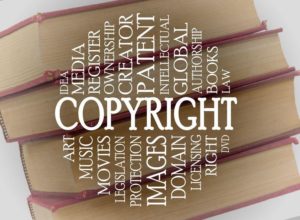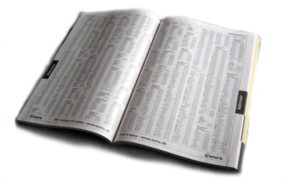 Despite the advent of many new forms of digital technology, artists, authors, actors and architects still look to federal copyright law to protect their creative works. While copyright law is quite broad, you can’t copyright everything. Keep these five points in mind as you consider copyrighting your original works of authorship.
Despite the advent of many new forms of digital technology, artists, authors, actors and architects still look to federal copyright law to protect their creative works. While copyright law is quite broad, you can’t copyright everything. Keep these five points in mind as you consider copyrighting your original works of authorship.
1. You Can’t Copyright Anything You Want, But You Can Copyright Alot.
Copyright protection is reserved for original works of authorship fixed in a tangible medium of expression. A work of authorship is any intellectual work, such as software code, literary, dramatic, musical or artistic work. Such work is “fixed in a tangible medium of expression” when it is more than just an idea or thought in someone’s head: it is recorded, written, or performed.
The threshold of originality required for authorship is relatively low. In fact, courts consider works showing a “modicum” of originality as meeting this requirement.
Copyright protection is not given to mere facts or data, such as information found in a phone book or directory. If, however, the arrangement of facts or data meet the “originality” threshold, the compilation may be eligible for copyright protection.
 Consider a phone book. People once use it to find out the names and phone numbers of local residents and businesses. It’s not entitled to any copyright protection because the U.S. Supreme Court decided it’s not original to list names of residents or businesses in alphabetical order.
Consider a phone book. People once use it to find out the names and phone numbers of local residents and businesses. It’s not entitled to any copyright protection because the U.S. Supreme Court decided it’s not original to list names of residents or businesses in alphabetical order.
2. Copyrights Don’t Last Forever, But Pretty Close.
Prior to 1978, a published work held copyright protection for 28 years from the time it was registered, and was eligible for a renewal of 67 years. However, in 1992, then Congressman Sonny Bono convinced the U.S. Congress to extend the term of protection.
Now, works created by a single person are protected for the life of the author plus 70 years. Works created “for hire” – as part of employment for a business – are protected for 95 years from the date of publication or 120 years from the date of creation, whichever expires first.
What about a work published prior to 1978 that was already in its renewal term in 1992? The life of that work was extended to a total of 95 years from the date the copyright was originally secured. Because of this law, Disney’s first incarnation of Mickey Mouse and Steamboat Willie will be protected by copyright law until January 1, 2024.
I’d insert a picture of Steamboat Willie here, but he’s still protected under copyright law. Even when his protection expires, we can’t use his picture without incurring legal consequences. Since Disney registered the Steamboat Willie version of Mickey as a trademark in 2009, he will be protected as long as Disney uses him.
3. When a Copyright Expires, the Work Enters the Public Domain and Anyone Can Use it.
Those works whose protection has expired “pass” into the public domain. Once a work is in the public domain, a person can freely use it without fear of prosecution or licensing fees.
A lot of the works currently in the public domain are those that did not make the 1992 renewal cut-off, predominantly published prior to 1923. For example, Arthur Conan Doyle’s four novels and 46 short stories about Sherlock Holmes published prior to 1923 happily reside in the public domain for major movie and TV studios to use at their creative discretion.
The next “class” of works to fall into the public domain will do so January 1, 2019, and includes “The Prophet” by Kahlil Gibran and “Stopping By the Woods on a Snowy Eve” by Robert Frost. Now you know why there are so many Sherlock Holmes remakes out there.
4. Even if a Work is Copyright Protected, You May be Able to Use it to Create Your Own Creative Work.
The power of a copyright comes from the Progress Clause in Article 1, Section 8, Clause 8 of the U.S. Constitution (“To promote the Progress of Science and useful Arts…”). It means, in essence, that works are protected to promote the arts.
Sometimes, creative types – think Weird Al Yankoviv – choose to use existing works and transform them into something of their own. This falls within the spirit of the Progress Clause. In these instances, a creator can ask the person holding the copyright for the original work for a license, preferably prior to creating the new work. A license lets the creator use a certain portion of the work for a period of time. It usually requires a fee and acknowledgement in the new work of the contributed material. Failure to obtain a license, or operating outside its parameters, can result in infringement and a big damage award.
The Band “The Verve” got into trouble with its 1990’s song “Bittersweet Symphony,” when it used notes outside the scope of a six-note license it had secured from the Rolling Stones. Not only did The Verve lose money in litigation, but it had to share writing credit with Mick Jagger and Keith Richards – the original authors of the song from which the notes came – and relinquish all royalties to Allen Klein, the Stones former manager who owns all of the bands’ pre-1970 music.
In limited cases, use of copyright protected material is considered fair use and can defeat a claim of infringement. Copyright law allows the use of a protected work for “criticism, comment, news reporting, teaching, scholarship or research.” This is how newspapers are allowed to publish images of celebrities. It’s also how parodies meet legal muster. However, these uses are limited, and it’s best to ask permission first. While Weird Al’s works are parodies, he seeks licenses for the underlying works in his songs.
5, You Don’t Have to Register Your Work to Gain Protection, But You’ll Regret it if You Don’t.
Under the common law, copyright protection naturally exists from the moment the work is created. That’s right, as soon as you start tapping the keyboard to write your mobile app, epic novel or symphony it’s protected by copyright law.
Given all the work you did to write your masterpiece you really should register the work with the U.S. Copyright Office for the affordable fee of $35 so you can effectively prosecute a claim of infringement of your work by others across the country. You also gain access to a variety of legal benefits, including statutory damages and attorney’s fees if you prevail in your lawsuit. If you have already “published” your work, which includes public performance or display, you can still register your work within five years of that publication in order to establish valid federal copyright protection.
